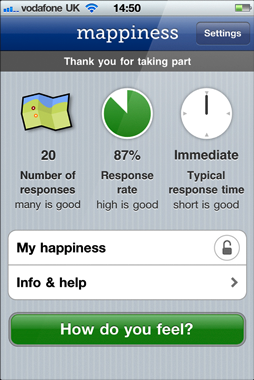But instead of the usual notification from Facebook informing me that my flatmate tagged me in yet another embarrassing photo, it's from an app I downloaded called Mappiness.

It's part of a research project at the London School of Economics (http://www.mappiness.org.uk/) I've been taking part in this experiment for about 6 months now. I log my happiness twice a day, as well as my location and whatever activity I'm doing. The results come in handy graph form too! But how accurate can this be? Can an iPhone app really measure your happiness?
I began by looking at my own results:
I am happiest
- on a Thursday (day off from Uni)
- at around 10pm
- elsewhere (as opposed to home or work)
- outdoors
- with friends / partner
I am happiest doing
#1 Exercise
#2 Socialising
#3 Shopping
#4 Computer games
#5 Drinking alcohol
...
#22 Travelling
#23 Seminars/Class
Wait a minute... exercise makes me happy?!
But thinking about it, I'm not even sure why that surprised me so much. Exercise regulates stress hormones and releases endorphins (morphine-like substance). I must have been on a natural high filling out Mappiness that day. That's one of things that's most interesting about this app, learning things about yourself you never knew.
Mappiness warns us not too take these results too seriously though. The Daily Mail ran an article from October 12th discussing Mappiness and how, from the results, Tuesday is on average the worst day of the week. It does strike me that today's society is increasingly reassured by statistics, especially those of 'averageness'; average earnings, average amount of children etc. Almost a recommended standard of normality.
But all in all, it's worth getting involved with this app. As well as helping out some scholarly folk, I've become more aware of my own moods and habits. I'll definitely be hitting the gym some more with a smile on my face =).
